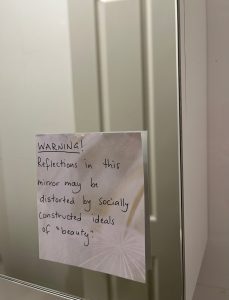A little while ago, I attended a seminar by a dietitian specialising in gut issues. It's not the most promising place to get inspiration for body image, but one anecdote from the day stuck with me. It was about a client (who did not have an eating disorder), who was very concerned about reducing stomach bloating. The dietitian worked with that client to hone in on a few likely “trigger foods”, including several foods that the client absolutely loved. The bloating was not painful, was not related to a health issue, and was not even particularly severe in intensity.
So why was the client so fixated on avoiding even minor amounts of bloating?
Because of a pair of jeans!
There’s no “give” in denim, so the bloating was uncomfortable and looked "bad" in that outfit.
The dietitian's response? “Why would you avoid foods you love just because of a bit of bloating? What you’re describing is actually a normal part of digestion! Just don’t wear jeans on the days you plan on eating those foods!”
What a wonderful solution! Instead of changing your entire diet to make your clothing choice work, why not stop wearing the clothes that make you second-guess your body instead?
Fashion and body acceptance. A logical pairing of ideals? (Answer: no)
I thought about how many of my own clients are at the mercy of their clothing as being a marker of their body’s “rightness”. Why? Do clothing manufacturers create clothing based on the dimensions of your average real person on the street? Are all clothes specially designed to make us feel comfortable when we put them on, regardless of what body shape or size we are? Or... is it just possible that the fashion industry is notorious for creating unrealistic clothing, often designed to be more of a "creative concept” than a solution for a real person?
Yet for all this, I’ve noticed a lot of people judge their bodies by clothing.
Imagine if a person walked in to speak with a podiatrist and said: “There must be something wrong with my feet because when I wear 4-inch stiletto heels, it hurts. I will never be satisfied with my feet until I can feel good in 4-inch heels!"
There's clearly nothing wrong with that person's feet, right? And nor is there anything wrong with your body just because your jeans don't fit well.
When fashion fancies influence body image.
Now let's look at clothing sizes. After all, they’re even less meaningful than stiletto heels are to the human form (well... no, probably stilettos are the worst). But clothing sizes are pretty meaningless. Here's an example. A person walks into two clothing shops one after the other (this actually happened). The clothes that fit in the second shop were almost 2 sizes larger than what fit her in the first shop! In an instant, her mood plummeted, and her mind filled with negative body talk. She was letting the random clothing sizes negatively impact her body image!
Fortunately, she made a great recovery with some excellent self-talk. She said to herself: “This is stupid! Five minutes ago you were happy with how you looked! Nothing about your body has changed between walking out of one shop and into the next one. It’s just a stupid marketing ploy to use stupid different sizing in different shops. I am not going to let this ruin my day!”
WIN! And here's the thing: fashion sizes should be considered unreliable no matter which shop you go into!
Who decides what dimensions the sizes are, anyway?
Clothing sizes are influenced by many things. Unfortunately, it’s often not particularly influenced by the needs of real bodies. Everyone knows some sizes run “small” or “large” in different brands. Likewise, buying clothes in different countries usually means people have to accept a different “standard”. I have a friend who makes her own clothes, and she’s commented that the “size standard” on the patterns she uses is “pretty much a work of fiction” and she just fiddles around to make it right. Sometimes you might even need to go up or down a size within a single shop! Doesn't sound like a very reliable framework for judging anything, right?
Bottom line: ignore the numbers, focus on the fit that's right for your body.
And some good news is that more and more fashion brands are working hard to create and market their clothing to a diverse range of body shapes and sizes. I even had a client send me a link to a clothing company which refuses to use any sizing at all, because of the way it makes people judgemental of their own bodies! Instead, their "sizes" are the first names of the 10 body-diverse women who they based the fit on. Love it!
What to do if clothing size is influencing your body image?
Some things you might consider are:
- cut the size tags off your clothes (the number is meaningless once the fit is achieved anyway).
- stick to brands you know have a comfortable fit for your shape.
- buy clothes for the body you have, not the body you think you should have, or used to have.
- think about styles of clothes that work for you. This doesn't mean baggy clothes that "hide" you (unless you genuinely love the look). Ask any stylist and they will tell you the right fit and style of clothing for your body shape will work with your body and make you feel fantastic.
- if you know your body shape is in a state of change, avoid options that are tight or form-fitting, and ideally will have a bit of "give" in the design.
- throw out or donate any old clothes that no longer work for your current body. Holding on to these can be "body toxic".
The bigger picture: noticing how you speak to your body.
Longer term, think about working to reframe how you think about your body. Do you criticise your body, or examine it for imperfections? Try to focus on optimising wellbeing in the body you have. Think about appreciating your body as a precious "vehicle" for living your life, rather than a thing to look at. This might be a topic you'd like to explore in more depth with a psychologist or other mental health practitioner, especially if it’s something that causes you distress. If you need to find someone to speak to, you might want to look here for credentialled eating disorder practitioners, or for a wider range of practitioners who work in this area, try here).
For further reading, The National Eating Disorders Collaboration has some good information about body image, as does the Butterfly Foundation.
You can also contact the Butterfly Foundation Helpline by phone or online at if this topic has raised some concerns or any upsetting thoughts that you would like to speak about more urgently.
Other Bloom Nutrition & Wellness articles you might be interested in:
- Feeling stuck with recovery? Read this.
- Why you should you think about working with a dietitian if you have an eating disorder.
Get in touch or make a booking with Bloom Nutrition & Wellness!
© 2022 Bloom Nutrition & Wellness. All rights reserved. Blog posts on the Bloom Nutrition & Wellness website provide information of a general nature only, and cannot and do not take the place of individualised advice from a qualified healthcare professional.



